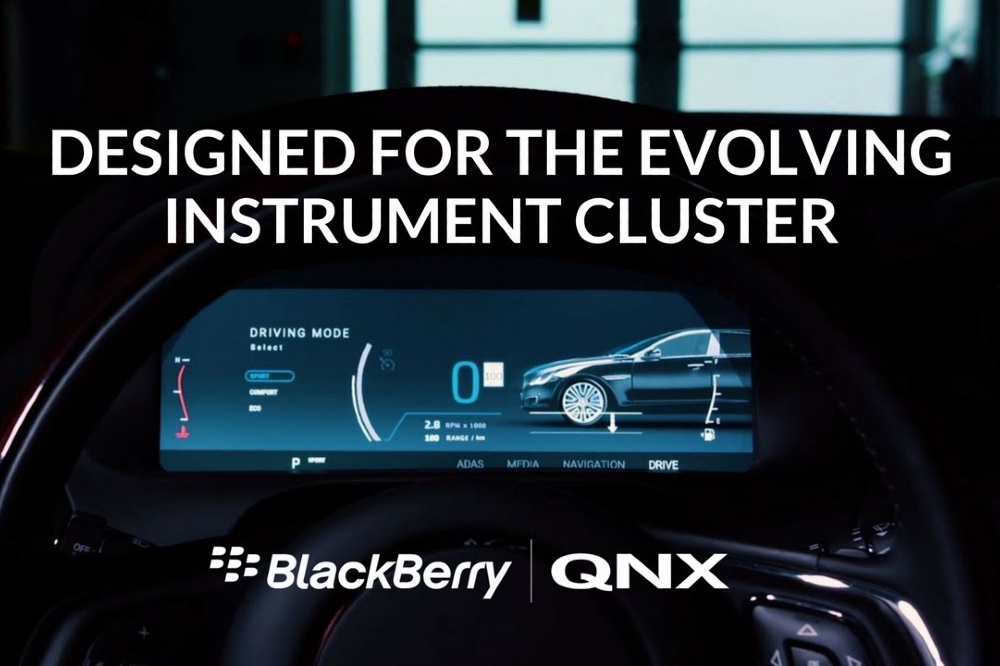The 2020s bring the promise of autonomous, connected cars, and in order to make that a reality, automakers will need to ensure that their cars are stacked full of technology. While Nvidia and Tesla have both promised high-end GPUs to power their vehicles, manufacturers also realise they need to leverage the cloud to make their cars smarter – which is why BlackBerry, which has a significant presence in the automotive sector with its QNX OS, is teaming up with Amazon Web Services to enhance the connected car experience.
Leveraging AWS’ Internet of Things (IoT) Services in the cloud and in the car, the QNX platform now enables automotive manufacturers to securely access data from vehicle sensors, and create software applications and machine-learning models for connected, electric, and autonomous vehicles.
This isn’t exactly new, with Tesla already widely deploying AI and machine learning technology in its electric vehicles, leveraging the cloud to make its cars smarter. With the cloud, Tesla has managed to drastically improve the performance of features such as its rain sensing wipers and autonomous driving systems, while users can also remotely control the car.
With the AWS-powered BlackBerry platform, automotive OEMs will be able to benefit from the same level of technology that has been packed into Tesla’s vehicles, without having to develop their own backend. This means car makers can be much quicker to market with these solutions than they would otherwise.
Using BlackBerry’s tech in conjunction with AWS means that OEMs can launch features ranging from cockpit personalisation, vehicle acoustic conditioning, vehicle health monitoring, and advanced driver assistance systems (ADAS). They can also leverage the platform for their new software-centric electric car and autonomous platforms, enabling essential functions such as continuous EV battery life monitoring and prediction, and managing vehicle sub-systems to holistically control warranty costs, providing important security updates and seamless updates of vehicle software features.
The AWS-powered BlackBerry platform combines the two companies’ edge and cloud technologies into a comprehensive edge-to-cloud offering for the global automotive industry. QNX software allows automotive OEMs to develop and run a common software platform across in-vehicle systems such as gateways, TCUs, engine controllers, digital cockpits and emerging domain controllers, while AWS capabilities enable automotive software developers to securely and easily access data from vehicle sensors, build software applications and machine learning (ML) models using vehicle data, and deploy them inside the vehicle to enable in-vehicle inference and actions. The platform will integrate the BlackBerry QNX operating system and over-the-air software update services, with AWS IoT cloud services for secure connectivity and telematics, Amazon SageMaker for developing ML models, and AWS IoT edge services for in-vehicle ML inference.
“By working with AWS, we can provide OEMs with a unique foundational software platform that will allow them to build the next generation connected and autonomous cars of the future,” said John Wall, senior vice president and co-head of BlackBerry Technology Solutions.
“By combining our technologies and strengths into one dedicated cloud-based offering, we can ensure automakers have the tools they need to deliver the driving experience consumers want, without sacrificing on the security and reliability they need.”
“Our automotive customers are developing exciting new products and services that rely on the power of the cloud, IoT, and AI/ML. We are thrilled to be working with BlackBerry QNX to provide secure connectivity and advanced edge computing capabilities for the next generation of electric and autonomous vehicles,” added Bill Vass, vice president, technology, Amazon Web Services, Inc.
“Combining the safety and security of QNX with AWS cloud and edge intelligence has the potential to speed the development of Karma’s connected car ecosystem,” concluded Lewis Liu, Karma Automotive vice president, business development and strategy.
“It shows how Karma’s vehicle platform is being used by technologists as a test-bed to prove new innovation, speed product development and ultimately to provide owners with leading cyber-security resources and predictive maintenance information via the latest artificial intelligence applications. The result is enhanced VVIP treatment for our discerning luxury-customer base, and cutting-edge technology that can lead to new business opportunities for Karma beyond pure automotive retail sales.”



